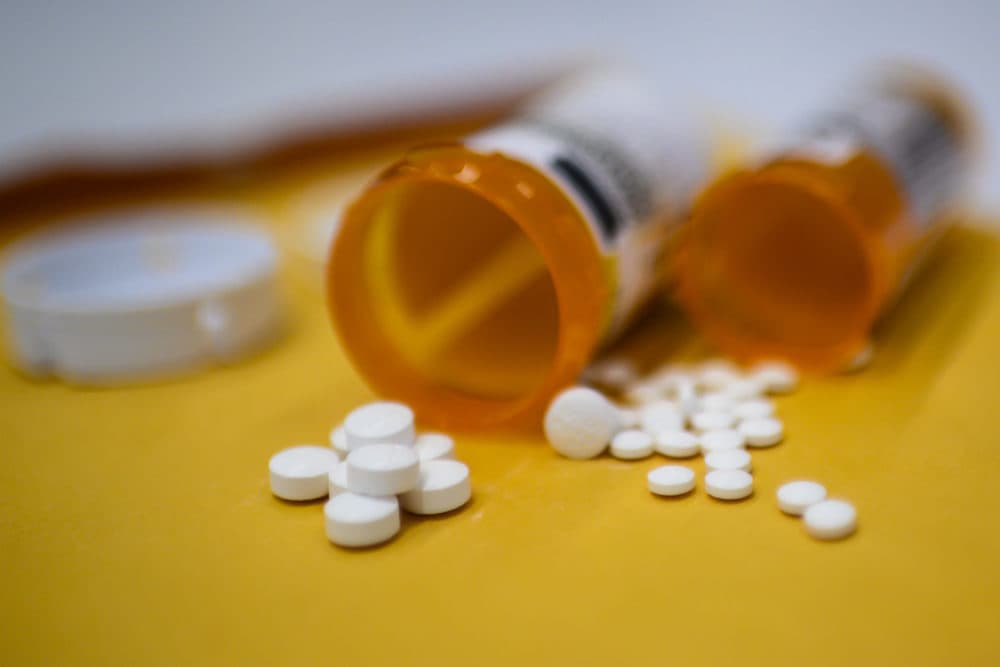Advertisement
Coronavirus Pandemic Compounds Another Ongoing Crisis: The Opioid Epidemic
Resume
Long before the coronavirus pandemic, one of the worst epidemics in the U.S. was opioid abuse.
In 2018, the last year complete data was made available by the Centers for Disease Control and Prevention, more than 67,000 people died of drug overdoses. Opioids such as heroin, fentanyl and prescription painkillers like Oxycontin, caused about 70% of those overdose deaths.
The opioid crisis hasn’t gone away since then, and in fact, the pandemic has made it worse, says Dr. Nora Volkow, director of the National Institute on Drug Abuse.
“We know that from reports of overdoses, these may have increased 30% [to] 40%,” she says. “We know also that from some of the reports from the states that there have been increases in overdose fatalities, that there have been increases in patients relapsing that had already achieved recovery. So we are hearing these distress calls from throughout the country.”
While public health officials know that social distancing helps stop the spread of the coronavirus, it can also have an adverse effect on those who suffer from substance abuse or psychological issues, Volkow says. Doctors are also particularly concerned about intentional overdoses and other suicide attempts due to coronavirus lockdowns.
“We have to face the reality that ... isolation is particularly hard for people suffering from substance use disorders, also depression or other psychiatric disorders,” she says. “Withdrawal and isolation actually just in general exacerbates the problem.”
Coronavirus shutdowns and hospital overcrowding are also limiting access to essential medications and services that people who are addicted to opioids rely on, she says.
“The stigma that has permeated addiction also makes it much less likely that people seek out help,” she says. “The fact that we're very isolated now, if someone is taking opioids and they overdose, the probability that someone sees them and can give them naloxone, which is necessary to reverse the overdoses, is much less likely.”
Rising unemployment is also cutting people off from society, Volkow says.
“If you're trying to achieve recovery, one of the components is that you want to integrate yourself to everyday life, and now it's much harder to get jobs,” she says.
Before the pandemic, the country was still struggling to get a handle on the opioid crisis. In 2017, deaths from opioid overdoses started to “level off,” Volkow says. But due to the rise in synthetic opioids such as fentanyl, “that data looks like it's actually going up again.”
Volkow says public health experts expect opioid overdoses to continue to rise in 2020 due to the pandemic. Overdose fatalities have become more difficult to track amid the pandemic, she says.
“In some of the communities, they are not doing autopsies because of the overwhelming situation with COVID-19, so we don't know those numbers,” she says.
Despite concerns the pandemic is compounding the opioid epidemic, Volkow says public health experts have adapted by providing telehealth services, including at-home medications and virtual therapy.
“Of course, not everybody has access to the web or a cell phone, and those are the ones that may actually require additional interventions,” she says.
Since the expansion of telehealth for addiction treatment is very recent, Volkow says doctors still don’t have a sense of how effective these services are, though many people have reported virtual services “are actually quite comparable sometimes with some of the interventions that are done face-to-face.”
Volkow says she would still encourage people who are struggling with addiction to seek treatment amid the pandemic, even though methods of treatment have changed.
“I would want them to know that there is treatment and that treatment works,” she says. “Addiction is a very serious disorder, and it can jeopardize your life. So seek help, seek treatment.”
If you or someone you know may be considering suicide, contact the National Suicide Prevention Lifeline at 1-800-273-8255 (En Español: 1-888-628-9454; Deaf and Hard of Hearing: 1-800-799-4889) or the Crisis Text Line by texting 741741.
Resources:
Julia Corcoran produced and edited this interview for broadcast with Todd Mundt. Samantha Raphelson adapted it for the web.
This segment aired on July 7, 2020.

